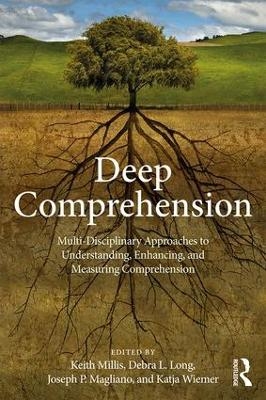
Deep Comprehension
Routledge (Verlag)
978-1-138-08901-3 (ISBN)
Keith Millis is Professor of Psychology at Northern Illinois University and Deputy Director of the Center for the Interdisciplinary Study of Language and Literacy (CISLL). He studies comprehension and learning from text. Debra L. Long is Professor of Psychology at the University of California, Davis. She studies the knowledge and processes that are involved in text comprehension using behavioral, electrophysiological, and individual difference techniques. Joseph P. Magliano is Professor of Psychology at Northern Illinois University and Director of the Center for the Interdisciplinary Study of Language and Literacy (CISLL). He studies comprehension processes for text and film. Katja Wiemer is Professor of Psychology at Northern Illinois University and Co-Director of the Cognitive Science program. Her research focuses on abstract concepts, embodiment, and causal relations in scientific explanations.
Part 1: Understanding Deep Comprehension 1. Prose Comprehension Beyond the Page Jennifer Wiley and Tricia A. Guerrero 2. Prose Comprehension Beyond the Word Revisited Rolf A. Zwaan 3. A Memory Retrieval View of Text Comprehension Debra L. Long and Erin M. Freed 4. Standards of Coherence in Reading: Variations in Processing and Comprehension of Text Marja Oudega and Paul van den Broek 5. What do We Think About When We Learn?Sidney K. D’Mello 6. Reusing Neural Networks for Deep Comprehension Manuel de Vega and David Beltran 7. What are We Reading for? A Disciplinary Literacy Perspective on Purpose Susan R. Goldman and MariAnne George Part 2: Using Technology to Increase Deep Comprehension 8. Learning Tasks in Electronic Environments: Advances Towards Interactive eTextbooks Eduardo Vidal-Abarca et al. 9. How can FACT Encourage Collaboration and Self-correction? Kurt VanLehn et al. 10. Design Principles for Virtual Humans in Educational Technology Environments Scotty D. Craig and Noah L. Schroeder 11. AutoTutor: An Intelligent Tutoring System and its Authoring Tools Zhiqiang Cai and Xiangen Hu 12. The Unreasonable Effectiveness of AutoTutor Andrew M. Olney 13. Scaffolding Adult Learners’ Reading Strategies in the Intelligent Tutoring System Haiying Li and Whitney Baer 14. Learning Scientific Inquiry from a Serious Game that Uses AutoTutor Keith Millis et al. Part 3: Measuring Deep Comprehension 15. Using Scenario-based Assessments to Measure Deep Learning Tenaha O’Reilly et al.16. Eliciting Deeper Evidence through Conversation-Based Assessments Blair Lehman and G. Tanner Jackson 17. NLP: Getting Computers to Understand Discourse Danielle S. McNamara et al. 18. Deep and Shallow Natural Language Understanding for Identifying Explanation Structure Peter Hastings, et al. 19. Deep Comprehension of Text Revealed by Talking and Writing While Reading Joseph P. Magliano, Karyn Higgs, and Keith Millis 20. Big Data for Thick Description of Deep Learning David Williamson Shaffer
| Erscheinungsdatum | 05.10.2018 |
|---|---|
| Zusatzinfo | 10 Tables, black and white; 8 Line drawings, black and white; 23 Halftones, black and white; 31 Illustrations, black and white |
| Verlagsort | London |
| Sprache | englisch |
| Maße | 152 x 229 mm |
| Gewicht | 440 g |
| Themenwelt | Geisteswissenschaften ► Psychologie ► Allgemeine Psychologie |
| Geisteswissenschaften ► Psychologie ► Pädagogische Psychologie | |
| Geisteswissenschaften ► Psychologie ► Verhaltenstherapie | |
| ISBN-10 | 1-138-08901-X / 113808901X |
| ISBN-13 | 978-1-138-08901-3 / 9781138089013 |
| Zustand | Neuware |
| Informationen gemäß Produktsicherheitsverordnung (GPSR) | |
| Haben Sie eine Frage zum Produkt? |
aus dem Bereich


